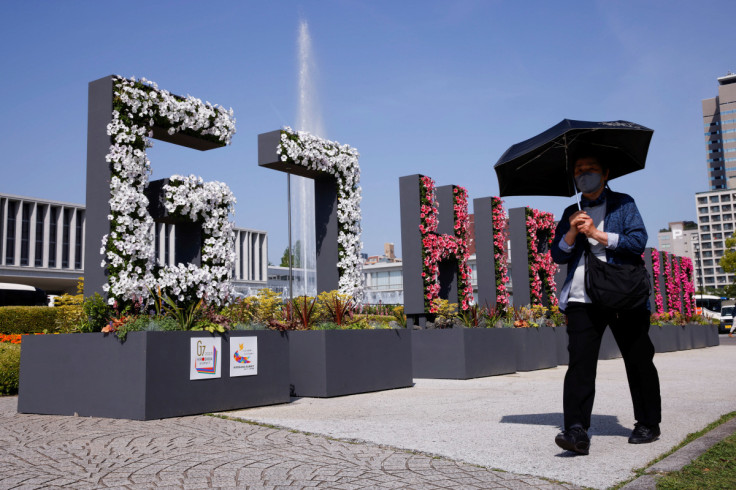At Japan's G7 Summit, The Big Elephants Are China And Russia

The longest shadows at the Group of Seven (G7) leaders' summit this week will be cast by two countries that weren't even invited to the Hiroshima gathering: China and Russia.
As the heads of the world's advanced democracies meet for three days from Friday in the western Japanese city, they will need to overcome some differences of their own, officials say, as they aim to project unity against challenges from Beijing and Moscow.
Divisions within the G7 appear to be the most notable over China, multiple officials told Reuters, with countries grappling on how to warn against what they see as China's threat to global supply chains and economic security without completely alienating a powerful and important trade partner.
The G7 countries -- the United States, Japan, Germany, the United Kingdom, France, Canada and Italy -- are all closely tied economically to China, the world's second-largest economy and a key global manufacturing base and market.
How the G7 will deal with the "great power competition" is an important issue for the summit, said Narushige Michishita, a professor at the National Graduate Institute for Policy Studies (GRIPS) in Tokyo.
"They have to address economic security and how to deal with sensitive technologies," Michishita said. "Everything is part of the great power competition that is taking place between the United States and Russia, and the United States and China."
Their differences on China were put in sharp focus after French President Emmanuel Macron visited Beijing last month and called for the European Union to reduce its dependence on the United States.
A senior U.S. administration official told Reuters this week the summit would show leaders unified behind a common approach to China, although he acknowledged it was "one of the more complex issues" for the meeting.
QUESTION OF LANGUAGE
The leaders are also set to discuss concern about China's use of "economic coercion" in its dealings abroad as part of their larger joint statement, with that main statement set to include a "section specific to China" Reuters has reported.
There will be a number of other declarations, senior German government sources have said, including on Ukraine, economic resilience and security, food security and others.
"I would call this a geopolitical G7, which will tackle a massive security crisis, which is the Russian aggression against Ukraine," a French presidency official said.
"It's also geopolitical because tensions between China and the United States are increasing and so we need to express the rules of the game so that we can preserve our international cooperation capacities," the official said.
Leaders from a number of other countries, including India and Vietnam, are also among those expected to attend as observers. The G7 is looking to draw closer to members of the "Global South" to counter China's role on the global stage.
But it remains to be seen how direct the language will be toward China. Some G7 members are sceptical about signing on to controls on investment into China.
While April's meeting of G7 foreign ministers acknowledged"the need to work together with China on global challenges" and reiterated its call for Beijing to act "as a responsible member of the international community", neither the group's climate nor finance chiefs directly mentioned China in their communiques.
The United States is at the forefront in pushing for stronger investment controls, yet Germany is more cautious, given its heavy reliance on trade with Beijing.
Germany wants to see screening of investments in targeted areas, not across the board, senior German government officials have said.
Japan is also sceptical about investment controls.
FROM RUSSIA TO TAIWAN
The leaders also plan to tighten sanctions on Russia, with steps aimed at energy and exports aiding Moscow's war effort, officials with direct knowledge of the talks have told Reuters.
The new moves will target sanctions evasion involving third countries, and seek to undermine Russia's future energy production and curb trade that supports Russia's military, they said.
On Russia's invasion of Ukraine there are differences in strategy on how to end the conflict.
The United States doesn't want to talk about a diplomatic path forward until it sees how the spring military offensive plays out, officials have said, even as its European allies want it to have a diplomatic solution in hand.
"From a European perspective, it's about Ukraine's partners doing everything they can to accelerate its victory," a European official said, adding that Europe's response to challenges from the United States and China were also important.
"We have to also learn to defend our interests," the official said.
For host Japan, it wants to send a clear message about the importance of the international, rules-based order, officials have said, as Tokyo worries that Russia's actions against Ukraine could embolden China's action against Taiwan.
© Copyright Thomson Reuters 2024. All rights reserved.





















